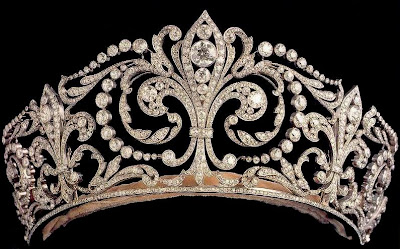In all the tiaras we've covered so far, we've dealt with a handful of Spanish tiaras - but somehow, we haven't gotten around to covering their most important one, a fact usually mentioned when this whopper tiara is requested. Let's fix that today, shall we?
 |
| The Fleur de Lys Tiara |
Another tiara from the collection of Queen Victoria Eugenia of Spain, this big gun was a wedding present from her husband King Alfonso XIII in 1906. It was made that same year by Ansorena of Madrid, which had been the court jeweler since 1860. The tiara features three large fleur de lys motifs, each filled with large round diamonds, and connected by swirls and scrolls including more significantly sized diamonds. It's set in platinum, which is fortunate for its users since platinum is said to be the lightest of the metals typically used in tiara construction. It generally goes by a very simple name, the Fleur de Lys Tiara - the fleur de lys is a significant symbol in heraldry, generally speaking, but is also a symbol of the House of Bourbon.
 |
| Queen Victoria Eugenia |
Victoria Eugenia (or Ena, as she was informally known) wore the tiara on her wedding day in a closed, coronet style - perfect to perch on top of her hair as was the fashion at the time. But in 1910, she had it opened up at the back, and now it sits lower on the head.
 |
| The Countess of Barcelona |
The tiara went with her into exile, and she continued to wear it for the rest of her life. Ena loaned it to her daughter-in-law, the Countess of Barcelona, on a few occasions - most notably,
for the coronation of Queen Elizabeth II in 1953. The tiara went into the possession of the Count and Countess after Queen Victoria Eugenia's death, and when the Spanish throne was restored in 1975 with their son Juan Carlos as king, they gave the grand jewel to his wife Sofia to be worn once again by a Queen of Spain.
 |
| Queen Sofia |
As I said, it's easy to call this the most important tiara in the Spanish collection - it's got size, symbolism, and history. But more than that, Queen Sofia treats it like the headline tiara. Its appearances are carefully chosen, for events like state visits from fellow monarchs. And it is not shared with her daughters or daughter-in-law, as other tiaras in her collection are; this is a queen's tiara. I believe it was last spotted in 2008, when Sofia wore it on a state visit to Japan, and it's hard to say when it might be seen again - the Spanish royals haven't had a tiara event for a few years.
Where does this rank on your list of favorite Spanish tiaras?
Photos: Casa Real/Geoffrey Munn/Life/Getty Images/Thai Monarchy







